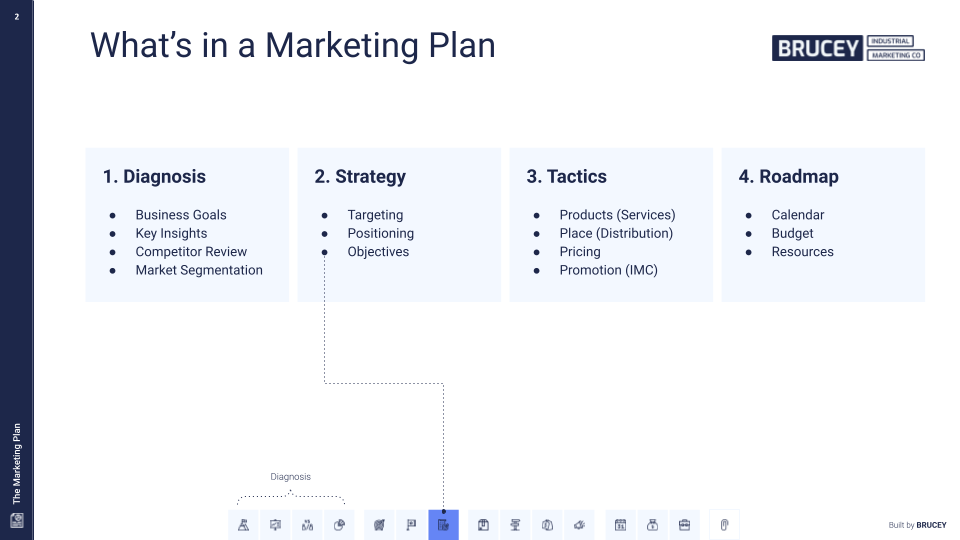Why should you even ask the question: What is marketing?
Because if you want to either:
a. start marketing orb. improve your marketing
you’ll get the best results out of your team and/or external agencies if you have a comprehensive understanding of what marketing is and how to do it.
If you’re a business leader or marketer, especially in the industrial sector, you can’t afford to spend time and money on reactionary, unmeasured marketing. You need a planned, strategic and quantifiable approach to marketing, to ensure that any marketing activity you implement is going to have a positive effect on your business: sales, profit, market share, customer value.
In this article we’ll discuss what marketing is and isn’t, then give a clear definition and process that can be used to maximise return on your marketing investment.
Marketing — common misconceptions
There are several terms bandied about that ultimately don’t fully capture marketing. They’re a bit like the story of the blind men describing an elephant: one said an elephant was a long and flexible tube (the trunk), another said a broad flat flap (the ear), another a thick tree trunk like creature (one leg), another a narrow whip like thing (the tail). But they were all describing only parts of an elephant. None of them could grasp the concept of a whole elephant.
Here are a few things that marketing is not (but which businesses often misconceive it as)
Sales as Marketing
Sales is a distinct and vital skill for most industrial businesses. But your sales team is most efficient when their leads are qualified and ready to be nurtured along the path to a deal. Instead of wasting valuable resources on scattergun sales calls and emails which may create problems for you with the likes of google, you need marketing that creates a funnel of qualified prospects.
Sales is part of marketing, not the whole.
‘Digital’ marketing vs ‘traditional’ marketing
‘Digital’ is sometimes used to convey a modern approach to marketing, but in reality digital has permeated almost every aspect of what a marketer does. And even so-called ‘traditional’ or offline tactics such as meeting prospects at a trade event will involve digital tools to promote the event, capture leads onsite, and nurture them post event.
Digital methods are part of the promotional tactics at your disposal, but don’t define ‘marketing’.
Marketing as promotion and advertising
Many people think of marketing in terms of the big campaigns for consumer products or services. The smaller budgets in most industrial businesses gives somewhat of a reality check to this, but many still have an unbalanced focus on advertising and promotions. They’re busy creating an email campaign, a new website, more social media posts, building a lead generation funnel, etc.
But promotional activities are only one of four tactical options that were defined in the 1960s by E Jerome McCarthy, the four Marketing Ps.
Marketing as the 4 Ps
A more sophisticated approach to marketing involves the four Ps as mentioned above:
- Product — understand and manage product range and lifecycle
- Price — linking price to real and perceived value
- Place (distribution) — the different channels to market
- Promotion — advertising, promotion, communications (online, offline and hybrid)
These 4Ps can give you a tactical plan of action. But that's all they are: the Tactics.
The key to successful marketing is to know and plan when to pull which levers.
But how do you decide on these?
That's where you need two other stages prior to Tactics. These are:
- Diagnosis (analysis)
- and Strategy
In Diagnosis, you seek to better understand your business as it is now, plus what market opportunities exist and the effects on your business of its operating environment. Then in Strategy you choose who you’re going to go after and why, what you’ll tell them, and set goals which are SMART (Specific, Measurable, Achievable, Relevant, and Time-Bound).
So while the four Ps give you tactical actions, they are not the full extent of marketing.
Marketing defined
Our description of marketing seems to be getting bigger and bigger. So, what exactly is marketing?
For a definition of marketing that is succinct and all encompassing, we turn to Peter Drucker, who defined marketing as follows:
“Marketing is the whole business, as seen from the point of view of its final result, that is from the customer’s point of view.”
He also said:
“Marketing is so (fundamental) that it is … not only much broader than selling; it is not a specialised activity at all. It encompasses the entire business.”
For a business to be able to embrace such a definition of marketing, it must seek to understand the customer’s perspective and act on it. This approach is sometimes referred to as ‘market orientation’. That is, the business is oriented toward the market (the customer). It’s really a fundamental first step in being successful in marketing.

The marketing process
Now that you have a better idea of what marketing is and is not, for you to actually ‘do marketing’ then, three fundamental stages are involved, as touched on above:
#1 Diagnosis
Understanding the business, market, external environment and past performance through research and analysis; then developing a sound map of the competitive environment in which the business operates.
#2 Strategy
Defining which segments of the market you are going to choose to target in a given period, how you will position the company to each target audience, and what measurable objectives you’ll set and measure the business against.
#3 Tactics
Choosing a selection of relevant tactics (from the 4 Ps) that can help you reach your target audience successfully and achieve your goals… rather than shooting from the hip or acting with a short-term, knee-jerk approach to marketing.
Fast tracking your marketing (or not getting bogged down)
If this is starting to look larger than that proverbial elephant, don’t worry. We understand that a business can’t stop while you retrain on marketing. You still have to make sales and survive.
The marketing process we've described above can be used to develop a plan in as little as a week — or even a day in some businesses we've worked with — when time is in short supply. It doesn't have to take months of research and soul searching.
Then, the plan can be implemented in a timely way, with ‘quick wins’ you can score on a tactical level, while setting aside time as part of that plan to do further research, analysis and strategic thinking as required.
If you need some guidance and inspiration — even just to get started and gather momentum — it could be time to engage some professional assistance. Importantly, you now know what marketing really means when you come to take on staff or engage with an agency.
Industrial marketing specialists
At Brucey, we have helped guide the marketing of dozens of industrial businesses. We know the unique challenges most industrial businesses face within a B2B framework such as:
- longer sales cycle
- high value purchase for customer
- multiple “buyers” in a single sale
- selling a “solution” with multiple aspects
- less emotion or impulsiveness to each sale.
For these and many other reasons, industrial businesses need great marketing just as much as, or even more than, those in any other sector.
No matter your business /marketing goals or scale of operation, we can tailor a service package that fits your business. To find out how we can help grow your industrial business, book a discovery call with us or call Dave on 0478638875.

